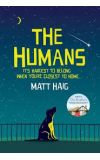
21 May 2013 14:23:04
Alerted to this amazing breakthrough on the other side of the universe, and convinced that the secret of primes cannot be entrusted to such a violent and backward species as humans, the super-advanced Vonnadorians dispatch an emissary to erase Martin and all traces of his discovery.
That's the backstory to a book that opens with our alien narrator finding himself in the body of the professor, whom he has just assassinated. But the instantaneous intergalactic travel hasn't turned out quite as expected. Instead of finding himself in Martin's office, our nameless Vonnadorian has arrived in the middle of the M11, with no understanding of human culture and wearing his victim's body but not a stitch of clothing.
Promptly run over, the naked alien hero regenerates, escapes from the shocked ambulance crew and heads to the nearest building – a weirdly rectangular and bizarrely static refuelling station labelled Texaco. Having flicked through a copy of Cosmopolitan to pick up the local language, he then makes his way to Cambridge. Here he continues to inspire much shouting and pointing until he reaches the ex-professor's college, where he is arrested.
These initial attempts to fit into human society may not have been completely successful, but they improve a little, thanks not only to his superior Vonnadorian intelligence but also to the fact that the late Professor Martin was evidently the kind of mathematical genius who could quite conceivably have had a breakdown that would leave him running around Corpus Christi college in the nude.
Stilted and strange though the alien's speech and behaviour continue to be, Martin's wife and teenage son spot hardly any difference from the original, save for some hilarious efforts to match the son's swearing and the suspicious way he bothers to put his used crockery in the dishwasher.
Actually, the Vonnadorian seems to offer an improved version of the human husband and father. The alien in turn, at first baffled and disgusted by humans, grows increasingly attached to his Earth family. This presents a real problem, given that the mission is to kill them both.
As this story develops, so the narrator and his narration change. Much of the first half of the novel is taken up by his puzzled analyses of primitive human ways: the nightly news, he reckons, should be renamed The War and Money Show; getting drunk is how humans forget they are mortal, while hangovers are how they remember. The conceit may not be original (it was back in the 70s that Craig Raine's Martian sent a postcard home, and the aliens rolled around their spaceship laughing at humans' potato-bashing in the Smash advert), but Haig uses it superbly. As our alien's emotional attachment grows, so too do his reflections on the odd appeal of our short and brutish lives, and especially on our gift for love. He goes on about this, often and at some length, culminating in a letter of advice he bequeaths to the son – a 97-point list six and a half pages long.
It would be very difficult to raise such reflections ("80. Language is euphemism. Love is truth") above the level of the "Desiderata" poster or the sort of wry and twinkly conclusions about what it means to be human that Spock was often subjected to at the end of a Star Trek episode. However, it's a mark of how funny and clever the rest of his novel is that Haig just about gets away with the love-is-truth guff. For all its later outbreaks of Vonnadorian mawkishness, The Humans still deserves to live long and prosper.

